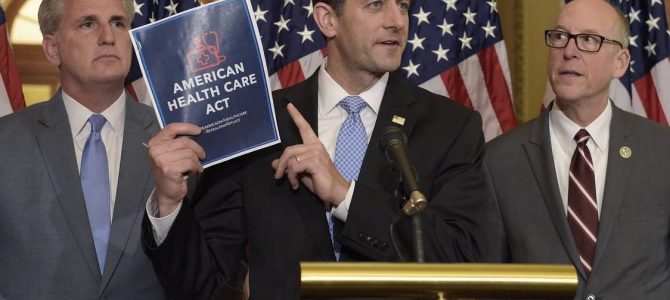
In January 2016, Congress sent President Barack Obama a bill that repealed the Affordable Care Act and cut federal funding for Planned Parenthood. The bill eliminated Obamacare’s Medicaid expansion and the exchange subsidies, among many other things. “We have now shown that there is a clear path to repealing Obamacare without 60 votes in the Senate,” House Speaker Paul Ryan claimed after the president vetoed the bill. “So, next year, if we’re sending this bill to a Republican president, it will get signed into law. Obamacare will be gone. … It’s just a matter of time.”
Well, it’s next year.
“Defund Obamacare Act” has a lot going for it. For one thing, it’s already been written and negotiated. Republican leadership supported the bill. The free-marketers voted for it. Thankfully, it also met with the endorsement of four moderate senators who recently sent a letter to Sen. Mitch McConnell with concerns over rollbacks of Medicaid expansion. Rob Portman of Ohio, Shelley Moore Capito of West Virginia, Lisa Murkowski of Alaska, and Cory Gardner of Colorado all supported the bill — with Gardner and Portman co-sponsoring it.
Obviously, bills can be tweaked to incorporate new ideas or fix old ones, but it’s not as if this is a fleeting policy debate. The GOP’s ability to grab hundreds of seats on every level of government was predicated on the promises found in the “Defund Obamacare Act.” So unless Republicans were contemptuous frauds who voted for positions they didn’t truly believe in (sometimes more than 50 times), what case do they have against reintroducing a bill that is fundamentally the same?
Is it political considerations? Well, rest assured, Democrats will oppose any plan Republicans support by deploying identical rhetoric. No matter how watered down the bill is, or how many tenets of Obamacare it preserves, Republicans will be accused of attacking the poor, women, and minorities at the behest of the wealthy. For progressives, the difference between the “Defund Obamacare Act” and the “American Health Care Act” is zilch. Any policy that fails to further incentivize the growth of the state or dependence will be met with the same hyperbolic resistance. Republicans have nothing to lose by supporting a consequential reform bill.
If you’re a Republican, you can also take for granted that the American Medical Association and AARP — which endorsed Obamacare although nearly every poll showed seniors opposed the law and despite the fact that the law raided Medicare funds — and about every other group that prefers giant bureaucracies meting out health care will oppose even the most tepid free-market-oriented solutions. Unless you pay it off, the AARP will never be on your side.
Also, assume that left-wing outfits like the Tax Policy Center will produce oodles of charts and reports illustrating how terribly markets will perform without technocratic guidance. This is the pseudoscience every proto-Vox pretend-wonk peddled about Obamacare in 2009-2010 — numbers long forgotten, and almost never accurate.
“GOP tries to discredit agency reviewing its health care bill,” says a CNN headline. “Republicans don’t have a CBO score yet on their health care bill, but they’re already taking shots at the CBO.” By “discrediting,” CNN means Sean Spicer and a few other Republicans have pointed out an indisputable fact: the Congressional Budget Office gets it wrong all the time.
The CBO, it should be noted, is nonpartisan and provides cost analysis to help legislators make economic and budgetary decisions. Nowhere does it make the claim of clairvoyance, as far as I know. Yet the CBO has already been discredited by partisans who do things like manipulate bills to get superior scores (you’ll remember Democrats gave the CBO seven years of paying for health care but 10 years of taxes) and treat economists as if they were seers. The CBO didn’t come close to predicting the cost of ACA. When it predicted Obamacare would kill millions of jobs, Democrats just argued the law was merely freeing Americans not to work. Also, the CBO hasn’t mattered in a long time.
If the GOP repeal efforts fail, reports The Washington Post, President Trump is likely to claim the Affordable Care Act is collapsing on its own and blame Democrats. Republicans will, no doubt, follow suit. While Trump’s stance may be substantively accurate, there is strong likelihood voters will blame the GOP anyway. This is the cost of winning elections.
Presumably most Republicans never imagined they’d ever be in a position to repeal. Whatever the case, it’s not even worth attempting to dismantle a massive law like Obamacare if the goal is to make everyone happy. It will be disruptive. Democrats offered fantastical notions about the future when pushing their bill, and it backfired. There will be tradeoffs, and some Americans will lose their insurance.
If you believe in a more decentralized, market-based system, you also believe that a larger number of Americans will end up with access to affordable insurance and better care in the long run. So rather than shirking townhalls, supporting half measures, and diverting blame, maybe it’s time to make compelling arguments for market-based solutions. You can start with the “Defund Obamacare Act.”








